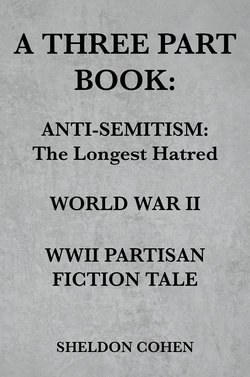Читать книгу A THREE PART BOOK: Anti-Semitism:The Longest Hatred / World War II / WWII Partisan Fiction Tale - Sheldon Cohen - Страница 10
На сайте Литреса книга снята с продажи.
CHAPTER 6 Albert, Sam, and Adolph as Young Men…1910-1914
ОглавлениеThe start of the twentieth century found the world coming closer together due to advances that enhanced communication (radio, telecommunications), transportation (faster ships, trains, airplanes), and warfare (armored vehicles, tanks, airplanes).
A hodge-podge of independent nations had difficulty coping with each other. Rivalries around the world increased and threatened war. Attempts at compromise were rarely successful. The absence of international bodies to resolve disputes left each country to fend for itself. This was a worldwide phenomenon and tensions around the world surfaced: Russia and Japan fought over Manchuria; Russia itself faced revolution and expanded southward to the Caucusus; Japan colonized Korea; Turkey lost control of the Balkans and independent nations rose up including Macedonia, Greece, Albania, Rumania and Serbia. European countries formed alliances for mutual protection. Austria-Hungary, Germany, and Italy formed the Triple Alliance, a relationship which Italy strained when they sided with the Balkan States against the Turks; in addition, Russia, France, and Great Britain formed the Triple Entente.
Some past history may be appropriate here.
Germany as a modern state originated through the efforts of Chancellor Otto von Bismarck of Prussia. In an effort to unite the country, Bismarck went to war, once with Austria and once with France in the latter part of the 1800’s. This was done with the idea of achieving a second German Reich (kingdom).
The First German Reich (800-1806) was the Holy Roman Empire founded by German emperors of medieval times. The second German Reich once formed developed its own constitution and a parliament (Reichstag) headed by a Kaiser (Latin for Caesar). The second German Reich was in power when Kaiser Wilhelm of Prussia declared war. World War I ignited in June of 1914, when Gavrilo Princip, a Serbian national, shot dead Archduke Francis Ferdinand, heir to the Austro-Hungarian throne, and his wife Sophie. The flashpoint had been reached. Europe instantly became involved in “The Great War, the war to end all wars.”
The vagabond, Adolph Hitler, was politically astute. He was twenty-five years of age at the start of the conflict and was overwhelmingly enthusiastic. Although an Austrian, he was allowed to join the German army. He felt that his life would now have meaning and he could participate in the development of a Greater German State worthy to take its place as the leader of the world. By this time he had unknowingly prepared himself for the future by steeping himself in political philosophy and geography.
Albert and Sam had only a peripheral understanding of international affairs, wrapped up as most eighteen year olds were in graduating high school and planning their next academic step. With the start of war, that would all change for the two boys—as well as for Adolph…
FIRST, Adolph.
In 1909, Hitler was still in Vienna, the capital of the Austro-Hungarian Empire, barely supporting himself with his paintings and odd jobs. By now both his parents were dead and what little inheritance he had was gone.
Vienna’s anti-Semitic environment molded his thinking even more in the direction of anti-Semitism which he vigorously embraced. Plus the dangerous geopolitical international situation in the world convinced him that democracies were doomed to failure. Countries could only prosper under strong leadership by one man: a dictatorship. He viewed Germany and Austria as failed states and preached the unification of Germany and Austria under one strong leader. He is quoted in his rambling treatise Mein Kampf (my struggle), written in 1923, as saying: “My inner aversion to the Hapsburg State was increasing daily. “This was a motley of Czechs, Poles, Hungarians, Ruthenians, Serbs and Croats, and always the bacillus which is the solvent of human society—the Jew.” As was obvious, he had an early start on his future deadly course.
SECOND Albert and Samuel
With relationships between countries the way they were in the first part of the twentieth century, conscripted armies became an essential part of government policy. Young men were registered in case it became necessary to send them to war. This became a mindset for teen agers who realized their lives could take a sudden turn...
And that is exactly what happened to Albert and Samuel while sitting in class one day in 1914. The classroom door opened and a stern looking man entered and handed the teacher a note. When the teacher finished reading, he looked up at the classroom and solemnly announced, “Gentlemen, Germany is at war!” The class, along with Albert and Sam leaped up as one and rushed outdoors to join the hordes celebrating on the streets. They knew they would soon be called up to serve and reflected this enthusiasm to their frightened parents who were powerless to do anything but pray that they would not be sacrificing their sons to an unknown future…
The next four years of this expected “short war” would be hell on earth for millions of young men.
